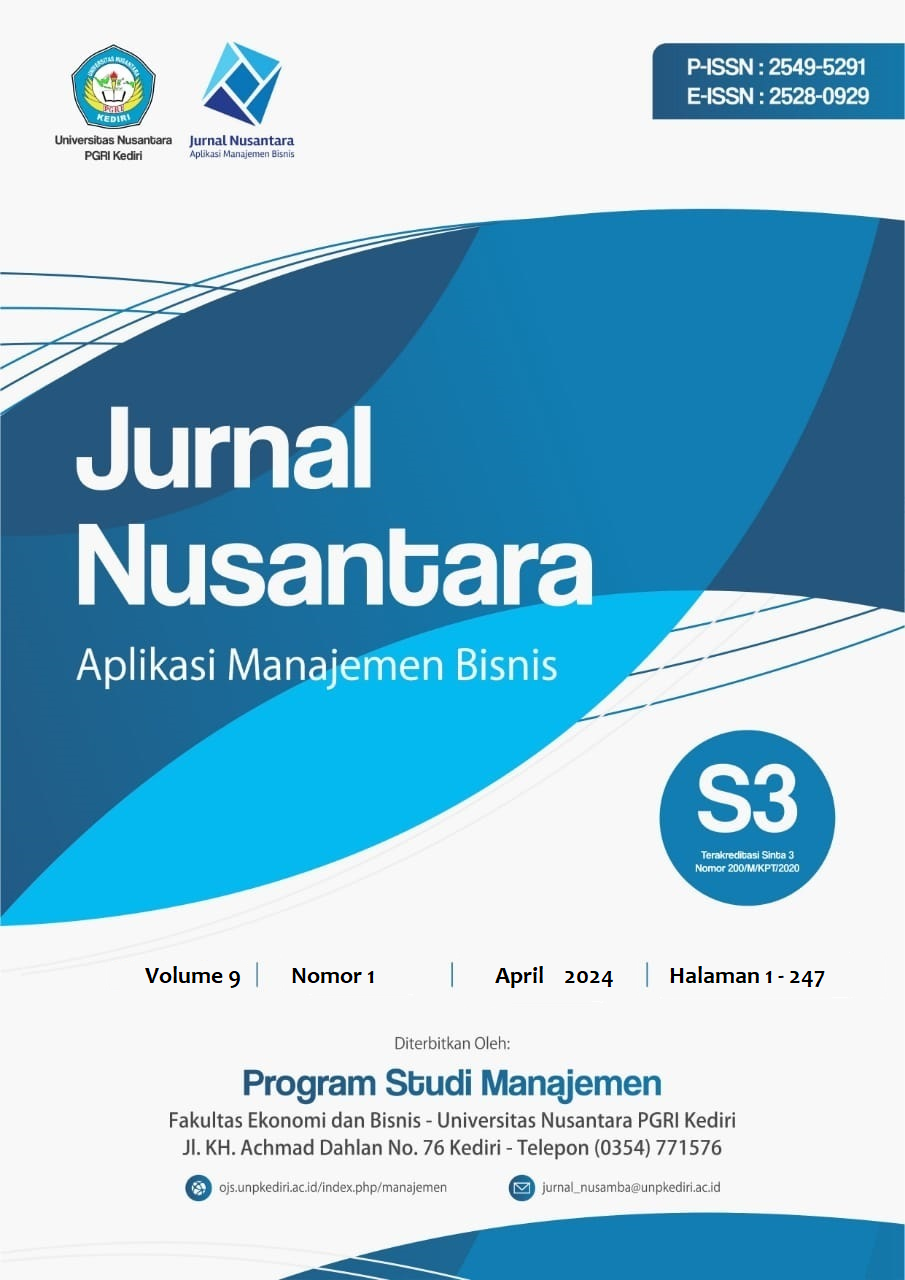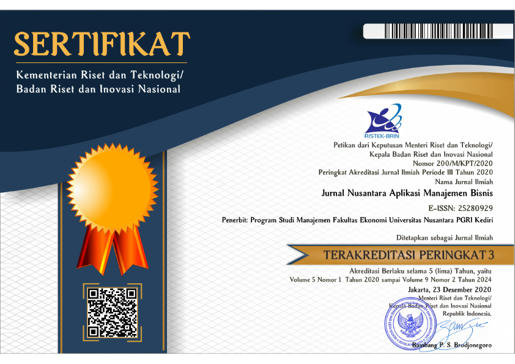Anteseden Perilaku Ketidakpatuhan Pajak pada Usaha Mikro, Kecil dan Menengah
DOI:
https://doi.org/10.29407/nusamba.v9i1.21254Keywords:
Tax Non-Compliance, MSMEs, Geopolitics, Public Governance Quality, Tax Service Quality, Tax System Rate, PenaltyAbstract
Research aim: This study scrutinizes tax non-compliance by integrating new variables from social and economic approaches such as geopolitics, tax service quality, public governance quality, tax system rate, and penalties.
Design/Methode/Approach: This research uses an explanatory research approach on 175 MSMEs in the food and beverage sector in Batu City. Moreover, using a census sampling technique.
Research Finding: The study's findings indicate that geopolitics, tax service quality, public governance quality, tax system rate, and penalties significantly influence tax non-compliance among MSMEs.
Theoretical contribution/Originality: As a contribution to tax knowledge, this research includes new variables in the tax non-compliance model which include social variables and psychological theory.
Practitioner/Policy implication: This research can be utilized to enhance the performance of government institutions and departments. The government, as well as tax authorities, can benefit from this research in developing solutions needed to eliminate or minimize the problem of tax non-compliance.
Research limitation: This research only focuses on MSMEs in the food and beverage sector in Batu City.
Downloads
References
[2] E. Rajagukguk and A. Firmansyah, “Ketidakpatuhan Pajak Pada Usaha Mikro, Kecil Dan Menengah,” J. Ilm. Ekon. Dan Bisnis, vol. 15, no. 2, pp. 110–121, 2018, doi: 10.31849/jieb.v15i2.1023.
[3] K. V Pashev, “Taxation and compliance of small business in transition economies: Lessons from Bulgaria,” in Taxation and public finance in transition and developing economies, Springer, 2008, pp. 363–388.
[4] R. A. Al-Saqqaf, “Brand Building Strategies of SMEs in Yemen:A Grounded Research that Investigates if Yemeni SMEs Follow Western Theory in Brand Building Practices.,” Dissertation, University of Nottingham, 2005.
[5] F. S. Fararah, “Islamic microfinance system and customer satisfaction: A study on SMEs sector in Yemen,” College University of Insaniah, Kedah, Malaysia, 2014.
[6] A. M. Ross and R. W. McGee, “Attitudes toward Tax Evasion: A Demographic Study of Malaysia,” Asian J. Law Econ., vol. 2, no. 3, pp. 13–58, 2011, doi: 10.2202/2154-4611.1028.
[7] A. Mas, A. Alhaji Aliyu, and E.-M. Jibreel Gambo, “Tax Rate and Tax Compliance in Africa,” Eur. J. Account. Audit. Financ. Res., vol. 2, no. 3, pp. 22–30, 2014.
[8] J. A. Roth and J. T. Scholz, Taxpayer compliance, volume 2: Social science perspectives, vol. 2. University of Pennsylvania Press, 2016.
[9] J. O. Otusanya, “Corruption as an Obstacle to Development in Developing Countries: A Review of Literature,” J. Money Laund. Control, vol. 14, pp. 387–442, 2011, doi: https://doi.org/10.1108/13685201111173857.
[10] J. O. Alabede, “An investigation of factors influencing taxpayers’ compliance behaviour: Evidence from Nigeria.” Universiti Utara Malaysia, 2012.
[11] M. G. Allingham and A. Sandmo, “Income tax evasion: A theoretical analysis,” J. Public Econ., vol. 1, no. 3–4, pp. 323–338, 1972.
[12] B. Torgler, “Tax morale: Theory and empirical analysis of tax compliance.” University_of_Basel, 2003.
[13] S. B. Agbadi, “Determinants of tax compliance: a case study of vat flat rate scheme traders in the Accra metropolis,” Unpubl. master’s thesis, Kwame Nkrumah Univ. Sci. Technol. Kumasi-Ghana, 2011.
[14] A. Stevenson and M. Waite, Concise Oxford English Dictionary: Book & CD-ROM Set. Oxford University Press, 2011.
[15] N. M. Sarker, “Arab spring and the contemporary geopolitics of the Middle East,” Peace Secur. Rev., vol. 6, no. 12, pp. 39–62, 2014.
[16] C. Flint, Introduction to geopolitics. Routledge, 2021.
[17] R. Kiely, “Spatial hierarchy and/or contemporary geopolitics: what can and can’t uneven and combined development explain?,” Cambridge Rev. Int. Aff., vol. 25, no. 2, pp. 231–248, 2012, doi: https://doi.org/10.1080/09557571.2012.678299.
[18] B. Teschke, “International Relations, Historical Materialism and the False Promise of International Historical Sociology,” Spectr. J. Glob. Stud., vol. 6, no. 1, pp. 1–66, 2014.
[19] I. Álvarez Ossorio, “The Syrian Conflict. A Hostage to Geopolitics,” IEMed Mediterr. Yearkb., pp. 17–21, 2019.
[20] S. C. Kim, Pastoral care for North Korean refugees and a geopolitical approach to practical theology: A qualitative study. Claremont School of Theology, 2011.
[21] N. Seth, S. G. Deshmukh, and P. Vrat, “Service quality models: a review,” Int. J. Qual. Reliab. Manag., 2005.
[22] M. Stiglingh, “Service quality framework for the South African Revenue Service from the perspective of the tax practitioner,” Public Relat. Rev., vol. 40, no. 2, pp. 240–250, 2014.
[23] B. R. Lewis, I. Reid, and D. Bamford, “Managing service quality,” Manag. Qual. 6e An Essent. Guid. Resour. Gatew., pp. 119–139, 2016.
[24] B. Torgler, M. Schaffner, and A. Macintyre, “Tax compliance, tax morale and governance quality,” CREMA Working Paper, 2007.
[25] E. Bruce-Twum, “Gift tax compliance in Ghana, an empirical study,” J. Financ. Account., vol. 2, no. 1, pp. 1–7, 2014, doi: :10.12691/jfa-2-1-1.
[26] C. M. Fischer, M. Wartick, and M. M. Mark, “Detection probability and taxpayer compliance: A review of the literature,” J. Account. Lit., vol. 11, p. 1, 1992.
[27] P. A. Imam and D. Jacobs, “Effect of corruption on tax revenues in the Middle East,” Rev. Middle East Econ. Financ., vol. 10, no. 1, pp. 1–24, 2014.
[28] J. D. Blank, “Collateral compliance,” U. Pa. L. Rev., vol. 162, p. 719, 2013.
[29] U. B. Ndako, A. A. Salisu, and M. O. Ogunsiji, “Geopolitical risk and the return volatility of Islamic stocks in Indonesia and Malaysia: A GARCH-MIDAS approach,” Asian Econ. Lett., vol. 2, no. 3, p. 24843, 2021.
[30] L. H. A. Al-Ttaffi and H. Abdul-Jabbar, “Geopolitical differences and tax non-compliance among Yemeni SMEs,” J. Bus. Manag. Account., vol. 8, no. 1, pp. 31–45, 2018, doi: https://doi.org/10.32890/jbma2018.8.1.8795.
[31] P. Asubonteng, K. J. McCleary, and J. E. Swan, “SERVQUAL revisited: a critical review of service quality,” J. Serv. Mark., 1996.
[32] L. T. N. Au, H. T. Hoang, and L. T. H. Ho, “Tax service quality for enterprises: development of a valid measurement scale,” Asia-Pacific J. Bus. Adm., no. ahead-of-print, 2022.
[33] L. H. A. Al-Ttaff and H. Abdul-Jabbar, “Service quality and income tax non-compliance among small and medium enterprises in Yemen,” J. Adv. Res. Bus. Manag. Stud., vol. 4, no. 1, pp. 12–21, 2016, [Online]. Available: https://www.akademiabaru.com/submit/index.php/arbms/article/view/1200.
[34] R. N. Hidayat, S. R. Handayani, and B. W. Otok, “SERVICE QUALITY AND REGIONAL TAX REGULATIONS INFLUENCE TAXPAYER COMPLIANCE INTERVENING TAXPAYER SATISFACTION AND BEHAVIOR USING STRUCTURAL EQUATION MODELING APPROACH.,” Int. J. Acad. Res., vol. 6, no. 4, 2014, doi: 10.7813/2075-4124.2014/6-4/B.31.
[35] C.-F. Chen and Y.-L. Kao, “Relationships between process quality, outcome quality, satisfaction, and behavioural intentions for online travel agencies–evidence from Taiwan,” Serv. Ind. J., vol. 30, no. 12, pp. 2081–2092, 2010, doi: https://doi.org/10.1080/02642060903191108.
[36] B. R. Jackson and V. C. Milliron, “Tax compliance research: Findings, problems, and prospects,” J. Account. Lit., vol. 5, no. 1, pp. 125–165, 1986.
[37] D. Kaufmann, A. Kraay, and P. Zoido-Lobatón, Governance matters II: updated indicators for 2000-01, vol. 2772. World Bank Publications, 2013.
[38] O. Vincent, “Assessing SMEs tax non-compliance behaviour in Sub-Saharan Africa (SSA): An insight from Nigeria,” Cogent Bus. Manag., vol. 8, no. 1, p. 1938930, 2021, doi: https://doi.org/10.1080/23311975.2021.1938930.
[39] P. C. Ser, “Determinants of tax non-compliance in Malaysia.” UTAR, 2013.
[40] T. W. Damayanti, T. F. C. W. Sutrisno, I. Subekti, and Z. Baridwan, “The Role of Taxpayer’s Perception of the Government and Society to Improve Tax Compliance,” Account. Financ. Res., vol. 4, p. 180, 2015.
[41] S. Aeini, M. Delavari, and Y. Goldust, “Identifying and Ranking Criteria of Good Governance in Project-Based Organizations,” J. Eng. Proj. Prod. Manag., vol. 12, no. 1, pp. 70–86, 2022, doi: 10.32738/JEPPM-2022-0007.
[42] B. Torgler, “Tax Compliance , Tax Morale,” 2007.
[43] G. Drogalas, E. Anagnostopoulou, M. Pazarskis, and D. Petkopoulos, “Tax ethics and tax evasion, evidence from Greece,” Theor. Econ. Lett., vol. 8, no. 05, p. 1018, 2018.
[44] P. C. N. Mwangi, “Factors influencing tax compliance among small and medium enterprises in Nairobi’s industrial area, Kenya.” University of Nairobi, 2014, [Online]. Available: http://hdl.handle.net/11295/73605.
[45] A. A. Alkhatib, H. Abdul-Jabbar, F. Abuamria, and A. Rahhal, “The effects of social influence factors on income tax evasion among the palestinian SMEs,” 2019, [Online]. Available: https://dspace.alquds.edu/handle/20.500.12213/5064.
[46] S. Youde and S. Lim, “The determinants of medium taxpayers’ compliance perspectives: empirical evidence from Siem reap province, Cambodia,” Int. J. Public Adm., vol. 42, no. 14, pp. 1222–1233, 2019, doi: https://doi.org/10.1080/01900692.2019.1591447.
[47] G. S. Becker, “Crime and Punishment: An Economic Approach,” J. Polit. Econ., vol. 76, no. 2, pp. 169–217, 1968, doi: 10.1086/259394.
[48] L. Anto, H. Husin, W. Hamid, and N. Bulan, “Taxpayer awareness, tac knowledge, tac sanctions, public service account ability and taxpayer compliance,” Accounting, vol. 7, no. 1, pp. 49–58, 2021, doi: http://dx.doi.org/10.5267/j.ac.2020.10.015.
[49] L. H. A. Al-Ttaffi and H. Abdul Jabbar, “Service quality and income tax non-compliance among small and medium enterprises in Yemen,” J. Adv. Res. Bus. Manag. Stud., vol. 4, no. 1, pp. 12–21, 2016.
[50] A. Al-Yasani, “An economic study of the impact of economic reform on the agricultural sector in Yemen,” College of Commerce, Al-Nailin University, Sudan, 2005.
[51] “DETERMINANTS OF TAX NON-COMPLIANCE BEHAVIOUR OF YEMENI SMEs : A MODERATING ROLE OF ISLAMIC RELIGIOUS PERSPECTIVE LUTFI HASSEN ALI AL-TTAFFI.”
[52] Elvania Nur Fadzilah & Rasyid Mei Mustafa & Negina Kencono Putri, “The Effect of Tax Understanding, Tax Payness Consciousness, Quality of Tax Service, and Tax Sanctions on Compulsory Tax of SMEs in Banyumas Regency,” Acta Univ. Danubius. OEconomica, vol. 13, no. 4, pp. 28–38, 2017.
[53] A. K. Fararah, F. S., & Al-Swidi, “The Role of the Perceived Benefits on the Relationship between Service Quality and Customer Satisfaction: A Study on the Islamic Microfinance and SMEs in Yemen Using PLS Approach,” Asian Soc. Sci., vol. 9, no. 10, pp. 18–36, 2013.
[54] I. Darby, J., Desbordes, R., & Wooton, “Does public governance always matter? How experience of poor institutional quality influences FDI to the South.,” CEPR DP, 2010.
[55] S. . Aribaba, F.O., Oladele, R., Ahmodu, A.L.O. and Yusuff, “ax policies and entrepreneurship sustainability in Ondo State, Nigeria,” J. Glob. Entrep. Res., vol. 9, no. 1, p. 53, 2019.
[56] J. F. Hair Jr, M. Sarstedt, L. Hopkins, and V. G. Kuppelwieser, “Partial least squares structural equation modeling (PLS-SEM): An emerging tool in business research,” Eur. Bus. Rev., 2014, doi: https://doi.org/10.1108/EBR-10-2013-0128.
[57] I. Ghozali and H. Latan, “Partial least squares konsep, teknik dan aplikasi menggunakan program smartpls 3.0 untuk penelitian empiris,” Semarang: Badan Penerbit UNDIP, 2015.
[58] E. C. Loo, C. Evans, and M. McKerchar, “Challenges in understanding compliance behaviour of taxpayers in Malaysia,” Asian J. Bus. Account., vol. 3, no. 2, pp. 145–161, 2010, doi: 10.2139/ssrn.2128378.
[59] P. DI Caro, M. Teresa Monteduro Fernando Di Nicola Paolo Puglisi, and by DI Paolo Caro, “Redistribution in real-world PIT: Evidence from Italian tax records Redistribution in real-world PIT: Evidence from Italian tax records *.”
[60] L.-Y. Lin, J.-F. Wang, and L.-M. Huang, “The impacts of service quality, promotion strategy, perceived value and customer trust on customer satisfaction: An example of the taxpayers of Taipei country tax bureau,” Xing Xiao Ping Lun, vol. 8, no. 4, p. 433, 2011.
[61] G. Kirchgässner, “Tax Morale, Tax Evasion, and the Shadow Economy,” 2010.
[62] R. Everest-Phillips, Max; Sandall, “inking Business Tax Reform with Governance : How to Measure Success,” 2009.
[63] U. Akpo, “The people as government: The importance of tax payment,” Akwa Ibom State Revenue Summit., 2009.
[64] S. K. Rahayu, Perpajakan Konsep dan Aspek Formal. Bandung: Rekayasa Sains, 2017.
[65] M. Mardiasmo, Perpajakan. Yogyakarta: Penerbit Andi, 2018.
[66] D. Musimenta, “Knowledge requirements, tax complexity, compliance costs and tax compliance in Uganda,” Cogent Bus. Manag., vol. 7, no. 1, 2020, doi: 10.1080/23311975.2020.1812220.
[67] N. S. Sapiei, J. Kasipillai, and U. C. Eze, “Determinants of Tax Compliance Behaviour of Corporate Studies,” eJournal Tax Res., vol. 12, no. 2, pp. 383–409, 2014.
[68] A. Ya’u, N. Saad, and A. Mas’ud, “Effects of economic deterrence variables and royalty rates on petroleum profit tax compliance in Nigeria: an empirical analysis,” Int. J. Energy Sect. Manag., vol. 14, no. 6, pp. 1275–1296, 2020, doi: 10.1108/IJESM-12-2019-0011.
[69] G. S. Iyer, P. M. J. Reckers, and D. L. Sanders, “Increasing tax compliance in Washington state: A field experiment,” Natl. Tax J., vol. 63, no. 1, pp. 7–32, 2010, doi: 10.17310/ntj.2010.1.01.
Downloads
Published
Issue
Section
License
Authors who publish with this journal agree to the following terms:
- Copyright on any article is retained by the author(s).
- The author grants the journal, the right of first publication with the work simultaneously licensed under a Creative Commons Attribution License that allows others to share the work with an acknowledgment of the work’s authorship and initial publication in this journal.
- Authors are able to enter into separate, additional contractual arrangements for the non-exclusive distribution of the journal’s published version of the work (e.g., post it to an institutional repository or publish it in a book), with an acknowledgment of its initial publication in this journal.
- Authors are permitted and encouraged to post their work online (e.g., in institutional repositories or on their website) prior to and during the submission process, as it can lead to productive exchanges, as well as earlier and greater citation of published work.
- The article and any associated published material is distributed under the Creative Commons Attribution-ShareAlike 4.0 International License












